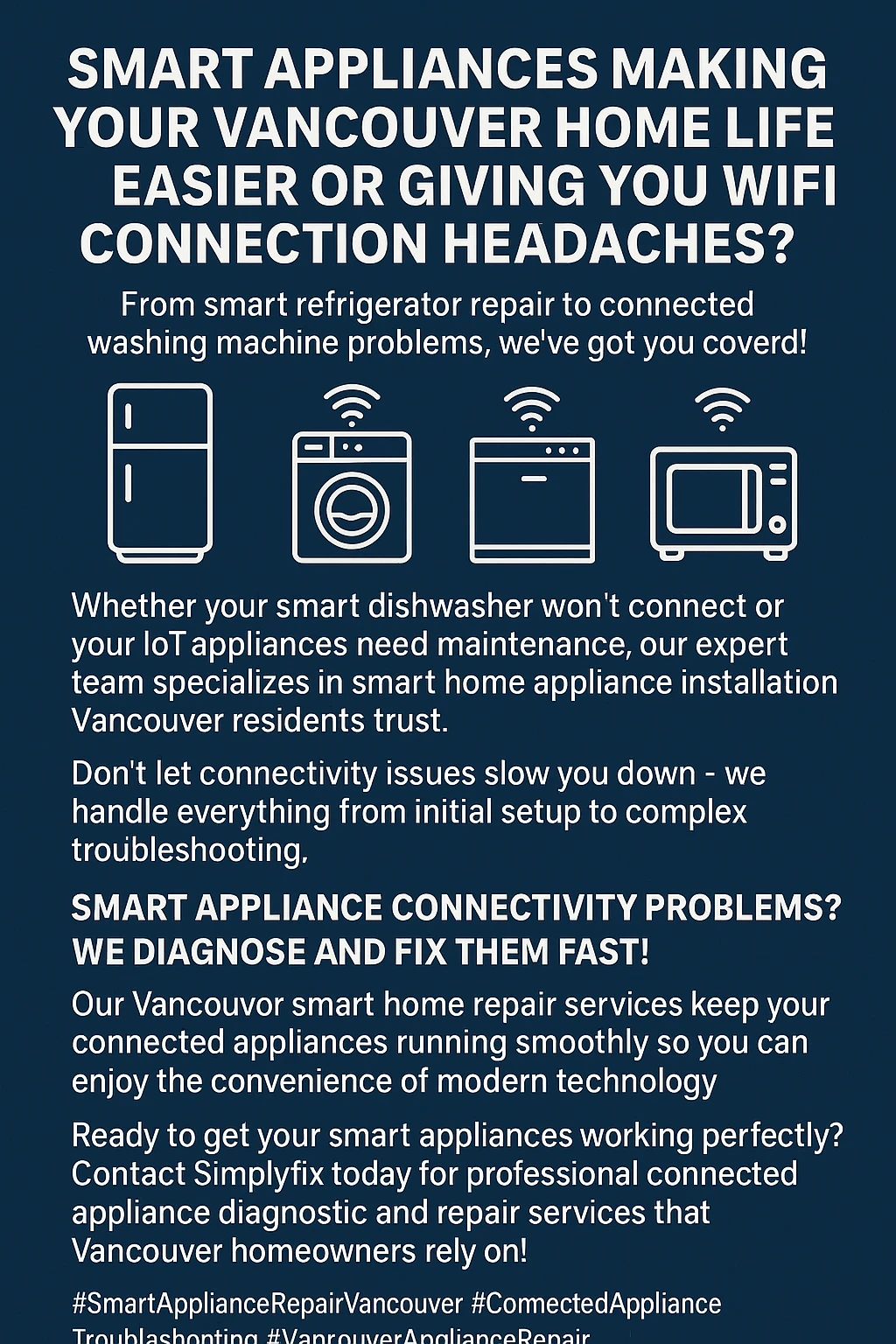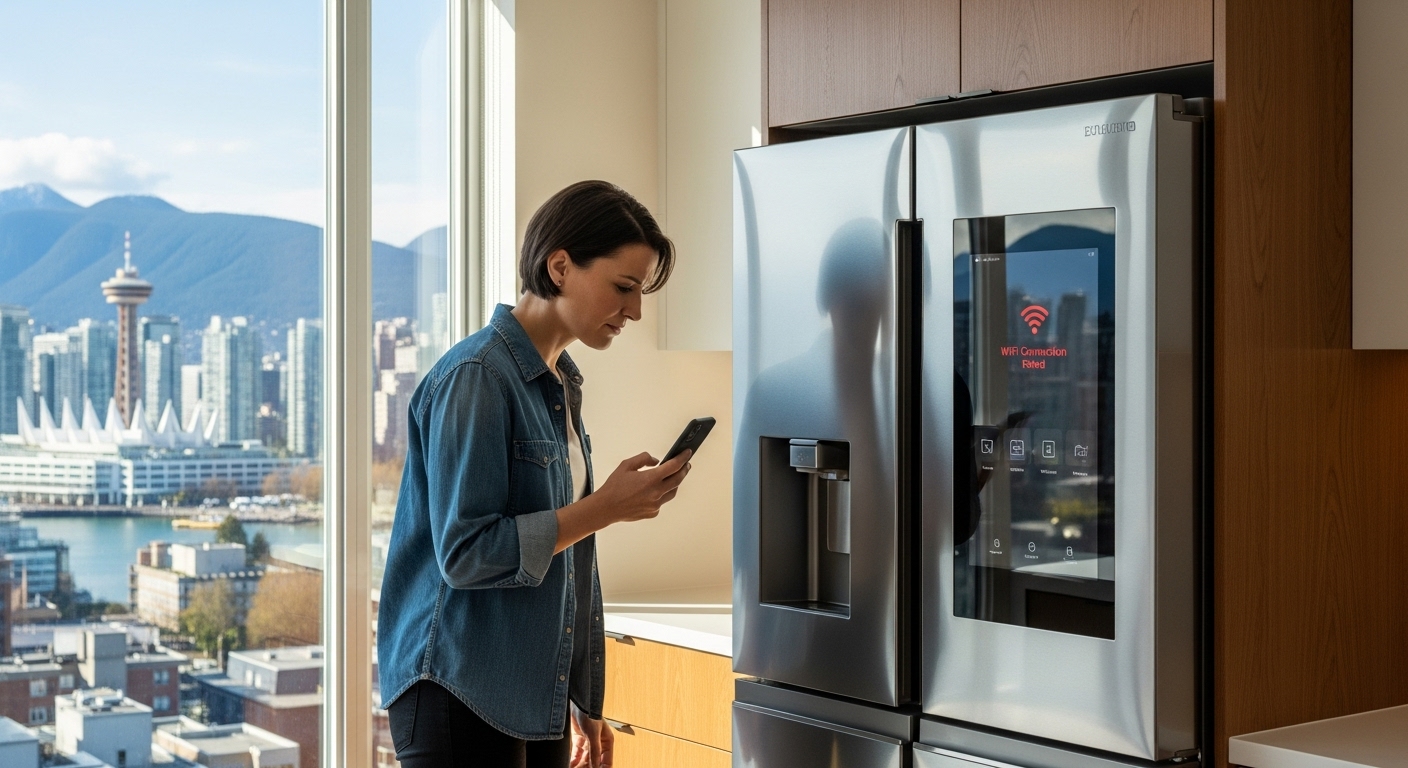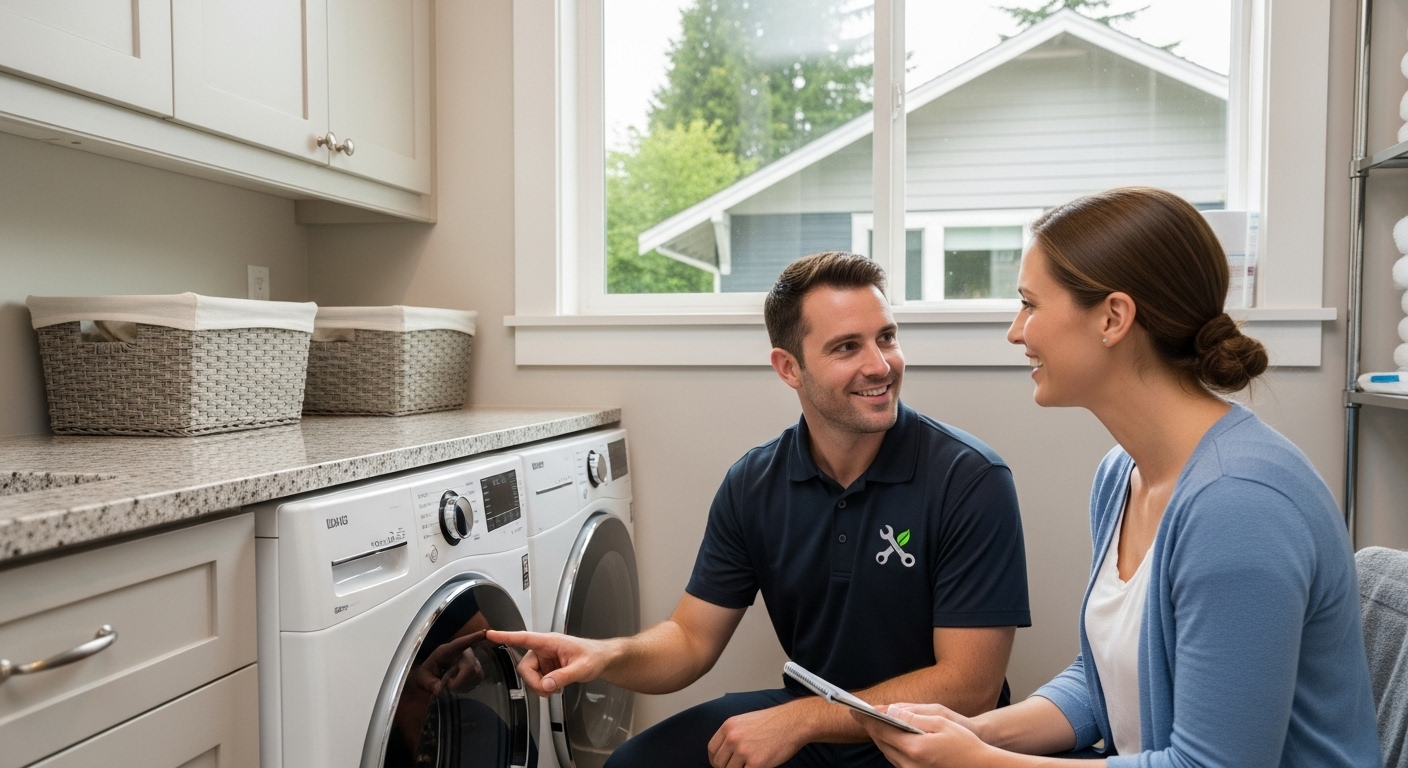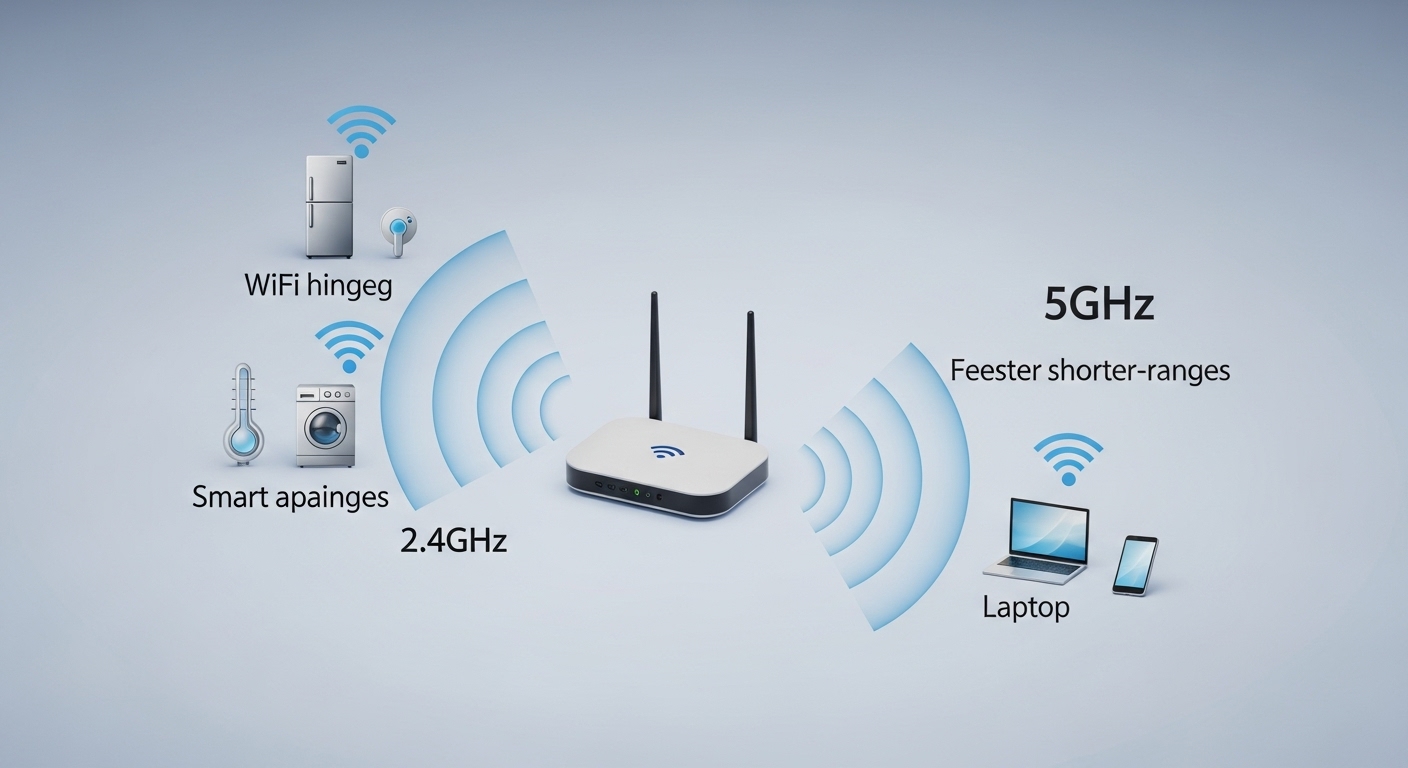Struggling to get your shiny new smart fridge to connect to your WiFi, or dealing with mysterious error codes on your connected washing machine? You’re not alone – Vancouver homeowners are rapidly embracing smart appliances, but many face unexpected challenges when it comes to integration and troubleshooting these high-tech household helpers.
Smart appliances have transformed from futuristic novelties into mainstream essentials, with Vancouver leading Canada’s adoption curve thanks to our tech-savvy, environmentally conscious population. From refrigerators that text you when the milk expires to washing machines you can control from your office downtown, these connected devices promise convenience and efficiency that traditional appliances simply can’t match. However, the transition isn’t always seamless, and many homeowners find themselves frustrated with connectivity issues, software glitches, and the complexity of integrating multiple smart devices into a cohesive system.
The reality is that smart appliances operate differently than their traditional counterparts, requiring stable internet connections, regular software updates, and often professional installation to function properly. Vancouver’s unique housing landscape – from heritage homes in Kitsilano to modern condos in Yaletown – presents distinct challenges for smart appliance integration, particularly when it comes to WiFi coverage and electrical requirements. Understanding these challenges upfront can save you time, money, and frustration while ensuring you get the most out of your connected appliance investment.
This comprehensive guide will walk you through everything Vancouver homeowners need to know about smart appliance integration, from choosing the right professional installation services to troubleshooting common connectivity issues and maintaining your devices for optimal performance. We’ll also explore local repair options, preventive maintenance strategies, and how to take advantage of BC Hydro’s generous rebate programs to make your smart home upgrade more affordable.
Key Takeaways:
- Smart appliances experience higher service call frequencies in their first three years compared to traditional appliances, with most issues being connectivity-related rather than mechanical failures
- Most smart appliances require 2.4GHz WiFi networks and cannot connect to 5GHz bands, making proper network configuration essential for successful integration
- Professional installation services in Vancouver can prevent 70% of common setup issues and ensure optimal performance from day one
- Predictive maintenance through IoT sensors can reduce appliance breakdowns by up to 50% while extending equipment lifespan significantly
- Vancouver homeowners can access up to $10,000 in BC Hydro rebates for energy-efficient smart appliance upgrades, with additional bonuses for multiple device installations

Understanding Smart Appliance Integration in Vancouver Homes

Vancouver’s position as a technology hub and environmentally progressive city has created ideal conditions for smart appliance adoption. Our city consistently ranks among the highest in Canada for smart home technology integration, driven by a population that values both innovation and sustainability. The combination of tech-forward thinking and environmental consciousness makes Vancouver residents early adopters of connected appliances that promise both convenience and energy efficiency. This adoption rate has created a robust local ecosystem of installation services, repair technicians, and support networks specifically tailored to smart appliance integration.
The most popular connected appliances in Vancouver homes include smart refrigerators with inventory tracking and energy monitoring, high-efficiency washing machines and dryers with remote control capabilities, dishwashers with cycle optimization features, and advanced HVAC systems that integrate with home automation platforms. These devices typically connect through WiFi networks and can be controlled via smartphone apps, voice assistants, or centralized home automation systems. Many Vancouver homeowners start with one or two smart appliances before gradually expanding to create fully integrated smart home ecosystems that can reduce energy consumption by 15-30%.
The integration benefits extend beyond mere convenience, aligning perfectly with Vancouver’s sustainability goals and the city’s commitment to reducing carbon emissions. Smart appliances can optimize energy usage based on time-of-day pricing, monitor consumption patterns to identify inefficiencies, and automatically adjust settings to minimize environmental impact. For Vancouver homeowners facing rising utility costs, these efficiency gains can translate to significant savings over the appliance’s lifespan. Additionally, many smart appliances qualify for rebates and incentives through BC Hydro’s energy efficiency programs, making the initial investment more attractive.
However, Vancouver’s unique climate and housing characteristics present specific challenges for smart appliance integration. The city’s high humidity levels, particularly during winter months, can affect sensor accuracy and connectivity reliability in some devices. Older heritage homes may require electrical upgrades to support the power requirements of modern smart appliances, while high-density housing in areas like Downtown and Richmond can create WiFi interference patterns that complicate network setup. Understanding these local factors is crucial for successful smart appliance integration and helps explain why professional installation services have become increasingly popular among Vancouver homeowners.
Professional Smart Appliance Installation Services in Vancouver

The growing complexity of smart appliance integration has given rise to a sophisticated network of professional installation services throughout Vancouver. These specialized technicians understand that modern connected appliances require more than just plugging into a wall outlet – they need proper network configuration, electrical safety verification, and integration with existing home systems. The investment in professional installation typically pays for itself by preventing costly troubleshooting sessions and ensuring devices operate at peak efficiency from day one.
Vancouver’s installation service landscape includes both national platforms and local specialists, each offering different advantages for homeowners. TaskRabbit’s Vancouver network features certified installers with proven smart home expertise, offering flexible scheduling and transparent pricing for individual appliance installations. These technicians typically handle single-device installations and can provide same-day service for urgent needs. Their platform allows homeowners to review installer ratings and experience levels, making it easier to choose the right professional for specific appliance types.
Local electrical contractors like Sarkinen Electrical have expanded their services to include comprehensive smart home automation, bringing years of Vancouver-specific experience to connected appliance installations. Their expertise in precision, reliability, and tech-driven solutions proves particularly valuable for complex installations that require electrical panel upgrades or hardwired connections. These local specialists understand Vancouver’s unique electrical codes and permit requirements, ensuring installations meet all safety standards while optimizing performance for local conditions.
Wolf AV represents the premium end of Vancouver’s smart home installation market, offering comprehensive consultation services that evaluate entire home ecosystems before recommending specific appliance integrations. Their approach emphasizes creating robust network infrastructure that can support multiple connected devices while maintaining reliable performance throughout the home. This level of service proves especially valuable for homeowners planning extensive smart home implementations or those dealing with challenging WiFi coverage in larger properties or older homes with thick walls and complex layouts.
The cost structure for professional installation varies significantly based on complexity and service level, with most Vancouver providers charging two-hour minimums ranging from $150 to $300 for basic installations. More complex integrations involving multiple devices, network optimization, or electrical upgrades can reach several thousand dollars, but these investments typically prevent costly problems and ensure optimal long-term performance. Many installation services also offer ongoing support packages that include software updates, troubleshooting assistance, and periodic system optimization – services that become particularly valuable as smart home ecosystems grow more complex over time.
Common Connectivity Issues and Network Requirements

WiFi connectivity problems represent the most frequent source of frustration for Vancouver homeowners integrating smart appliances, with network configuration issues accounting for roughly 70% of initial setup problems. Understanding the specific network requirements of connected appliances can prevent most of these issues and ensure reliable long-term operation. The key insight that many homeowners miss is that smart appliances have fundamentally different network needs than smartphones, tablets, or computers, requiring specific configurations that aren’t always intuitive to set up correctly.
The most critical network requirement that causes widespread confusion is WiFi band compatibility. Most smart appliances only connect to 2.4GHz networks and will not work with 5GHz networks, despite 5GHz offering faster speeds for other devices. This limitation exists because appliance manufacturers prioritize range and wall penetration over speed, since smart appliances typically send small amounts of data and are often located in areas with weaker WiFi signals like basements, utility rooms, or kitchen areas surrounded by metal appliances that can interfere with wireless signals.
Vancouver’s housing diversity creates unique WiFi coverage challenges that can complicate smart appliance connectivity. Heritage homes with thick plaster walls, modern condos with concrete construction, and multi-level townhouses all present different signal propagation characteristics that affect appliance placement and connectivity reliability. Appliances installed in basements, laundry rooms, or kitchens often experience weak signals that cause intermittent connectivity issues, leading to frustrating situations where

Recent Comments